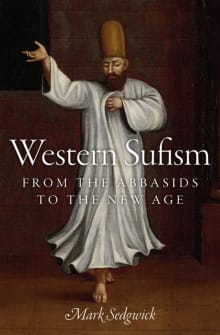Western Sufism
By Mark Sedgwick

Book description
Western Sufism is sometimes dismissed as a relatively recent "new age" phenomenon, but in this book, Mark Sedgwick argues that it actually has very deep roots, both in the Muslim world and in the West. In fact, although the first significant Western Sufi organization was not established until 1915, the first Western discussion of Sufism was printed in 1480, and Western interest in some of the ideas that are central to Sufi thought goes back to the thirteenth century.
Sedgwick starts with the earliest origins of Western Sufism in late antique Neoplatonism and early Arab philosophy, and traces later origins in repeated intercultural transfers from the Muslim world to the West, in the thought of the European Renaissance and Enlightenment, and in the intellectual
and religious ferment of the nineteenth century. He then follows the development of organized Sufism in the West from 1915 until 1968, the year in which the first Western Sufi order based not on the heritage of the European Middle Ages, Renaissance and Enlightenment, but rather on purely Islamic models, was founded. Later developments in this and other orders are also covered.
Western Sufism shows the influence of these origins, of thought both familiar and less familiar: Neoplatonic emanationism, perennialism, pantheism, universalism, and esotericism. Western Sufism, then, is the product not of the new age but of Islam, the ancient world, and centuries of Western religious and intellectual history. Drawing on sources from antiquity to the internet, Mark Sedgwick demonstrates that the phenomenon of Western Sufism not only draws on centuries of intercultural
transfers, but is also part of a long-established relationship between Western thought and Islam that can be productive, not confrontational.
Explore this book Preview
Bookshop.org
Amazon
Shepherd is reader supported.
When you buy books through our website, we may earn an affiliate commission. Please help us make book discovery magical and join our membership program.
Why read it?
1 author picked Western Sufism as one of their favorite books. Why do they recommend it?
 Alexander Knysh
Alexander KnyshWhile the author of my second recommended book sought Sufi wisdom in the “Muslim Orient,” this wisdom has become an integral part of intellectual, cultural, and spiritual life in “Occidental” societies. A peculiar mixture of Neoplatonic emanationism, Sufi poetry, music and rituals, perennialism, pantheism, esotericism, and New Age religiosity, it has captivated the minds and souls of Western academics, anarchists, artists, architects, faith healers, physicians, and psychiatrists, who rearranged these diverse elements to create their own distinctive versions of Sufi spirituality and lifestyle. Lively and witty, the author’s narrative guides us through several “cultural transfers”—premodern, modern, and New Age—from the Muslim world to the West, culminating in the emergence of “Western Sufism” represented by the major public figures, celebrities, and charismatic teachers.
